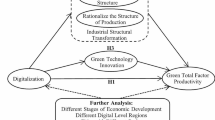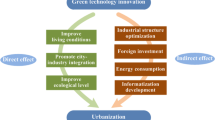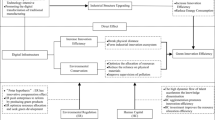Abstract
To improve the effectiveness of urban green innovation, digitalization has become increasingly vital in the framework of the period of energy and digital transformation, permitting the “dual carbon” aim. In this article, the influence of information and communication technology on green economic recovery in China’s cities is explored in a novel way. This research examines the direct impact, mediating effect, nonlinear connection, and geographical and development disparities of ICT growth on green economic recovery using panel data from China's 216 prefecture-level cities from 2010 to 2019. In addition to regional and urban variation in green innovation performance, this study demonstrated that technology transformation greatly enhanced the level of entrepreneurial orientation after accounting for carbon dioxide emissions from energy consumption. A new dynamic threshold model illustrates how the influence of information technology growth on green economic recovery changes depending on the degree of resource imbalance. Research shows that digitalization has a beneficial effect on technological development and that tech development has a favorable impact on green innovation performance. As a result, technical innovation serves as a bridge between digitalization and green innovation. The influence of digitization on the implementation of sustainable performance might be moderated by different exposure to environmental regulations.
Similar content being viewed by others


References
Ahamd M (2019) State of the art compendium of macro and micro energies. Adv Sci Technol Res J 13(1):88–109
Ahmadian-Yazdi F, Mesgarani M, Roudari S (2022) Natural resource rents and social capital interaction: new evidence on the role of financial development. J Environ Assmt Pol Mgmt 24(01):2250021. https://doi.org/10.1142/S1464333222500211
Alemzero DA, Iqbal N, Iqbal S, Mohsin M, Chukwuma NJ, Shah BA (2021) Assessing the perceived impact of exploration and production of hydrocarbons on households perspective of environmental regulation in Ghana. Environ Sci Pollut Res 28:5359–5371
Banerjee R, Mishra V, Maruta AA (2021) Energy poverty, health and education outcomes: evidence from the developing world. Energy Econ. https://doi.org/10.1016/j.eneco.2021.105447
Barbier EB, Burgess JC (2017) Natural resource economics, planetary boundaries and strong sustainability. Sustain (Switzerland) 9(10):1858. https://doi.org/10.3390/SU9101858
Bessembinder H (1991) Forward contracts and firm value: investment incentive and contracting effects. J Financ Quanti Anal 26(4):519. https://doi.org/10.2307/2331409
Bourcet C (2020) Empirical determinants of renewable energy deployment: a systematic literature review. Energy Econ 85:104563
Brunner R, Norouzi S (2021) Going green across borders: a study on the impact of green marketing on the internationalization of SMEs
Cao J, Law SH, Samad ARBA, Mohamad WNBW, Wang J, Yang X (2021) Impact of financial development and technological innovation on the volatility of green growth—evidence from China. Environ Sci Pollut Res 28(35):48053–48069
Chang L, Qian C, Dilanchiev A (2022) Nexus between financial development and renewable energy: empirical evidence from nonlinear autoregression distributed lag. Renew Energy 193:475–483. https://doi.org/10.1016/j.renene.2022.04.160
Chang L, Iqbal S, Chen H (2023) Does financial inclusion index and energy performance index co-move? Energy Policy 174:113422
Chien FS, Sadiq M, Kamran HW, Nawaz MA, Hussain MS, Raza M (2021) Co-movement of energy prices and stock market return: environmental wavelet nexus of COVID-19 pandemic from the USA, Europe, and China. Environ Sci Pollut Res. https://doi.org/10.1007/s11356-021-12938-2
Darling S, Harvey B, Hickey GM (2022) Advancing pluralism in impact assessment through research capacity: lessons from the Yukon Territory, Canada. J Environ Assess Pol Manag. https://doi.org/10.1142/S1464333222500260
Diao X, McMillan M, Rodrik D (2019). The recent growth boom in developing economies: a structural-change perspective. In: The Palgrave handbook of development economics. Springer, pp 281–334
Dilanchiev A, Taktakishvili T (2022) Macroeconomic determinants of household consumptions in Georgia. Annal Financ Econ. https://doi.org/10.1142/S2010495221500202
England RW (2000) Natural capital and the theory of economic growth. Ecol Econ 34(3):425–431. https://doi.org/10.1016/S0921-8009(00)00187-7
Erahman QF, Purwanto WW, Sudibandriyo M, Hidayatno A (2016) An assessment of Indonesia’s energy security index and comparison with seventy countries. Energy 111:364–376. https://doi.org/10.1016/j.energy.2016.05.100
Erumban AA, Das DK, Aggarwal S, Das PC (2019) Structural change and economic growth in India. Struct Chang Econ Dyn 51:186–202
Farkas A, Degiuli N, Martić I, Barbarić M, Guzović Z (2022) The impact of biofilm on marine current turbine performance. Renewa Energy 190:584–595. https://doi.org/10.1016/j.renene.2022.03.134
Fraccascia L, Giannoccaro I, Albino V (2018) Green product development: what does the country product space imply? J Clean Prod 170:1076–1088. https://doi.org/10.1016/j.jclepro.2017.09.190
French S (2017) Revealed comparative advantage: what is it good for? J Int Econ 106:83–103. https://doi.org/10.1016/j.jinteco.2017.02.002
Ghisellini P, Cialani C, Ulgiati S (2016) A review on circular economy: the expected transition to a balanced interplay of environmental and economic systems. J Clean Prod 114:11–32. https://doi.org/10.1016/j.jclepro.2015.09.007
Gilal FG, Chandani K, Gilal RG, Gilal NG, Gilal WG, Channa NA (2020) Towards a new model for green consumer behaviour: a self-determination theory perspective. Sustain Dev. https://doi.org/10.1002/sd.2021
Graham JR, Rogers DA (2002) Do firms hedge in response to tax incentives? J Financ 57(2):815–839. https://doi.org/10.1111/1540-6261.00443
Guan F, Liu C, Xie F, Chen H (2019) Evaluation of the competitiveness of China’s commercial banks based on the G-CAMELS evaluation system. Sustainability 11(6):1791
Hafner S, Jones A, Anger-Kraavi A, Pohl J (2020) Closing the green finance gap–A systems perspective. Environ Innov Soc Trans 34:26–60
Hickel J, Kallis G (2020) Is green growth possible? New Politic Econ 25(4):469–486
Huang J, Wang X, Liu H, Iqbal S (2021) Financial consideration of energy and environmental nexus with energy poverty: promoting financial development in G7 economies. Front Energy Res 9:777796
Iqbal S, Bilal AR (2021) Energy financing in COVID-19: how public supports can benefit? China Finan Rev Int 12(2):219–240
Iqbal W, Yumei H, Abbas Q, Hafeez M, Mohsin M, Fatima A, Jamali MA, Jamali M, Siyal A, Sohail N (2019) Assessment of wind energy potential for the production of renewable hydrogen in Sindh province of Pakistan. Processes. https://doi.org/10.3390/pr7040196
Iqbal S, Bilal AR, Nurunnabi M, Iqbal W, Alfakhri Y, Iqbal N (2021) It is time to control the worst: testing COVID-19 outbreak, energy consumption and CO2 emission. Environ Sci Pollut Res 28:19008–19020
Iram R, Zhang J, Erdogan S, Abbas Q, Mohsin M (2020) Economics of energy and environmental efficiency: evidence from OECD countries. Environ Sci Pollut Res. https://doi.org/10.1007/s11356-019-07020-x
Jiang L, Wang H, Tong A, Hu Z, Duan H, Zhang X, Wang Y (2020) The measurement of green finance development index and its poverty reduction effect: dynamic panel analysis based on improved Entropy method. Discrete Dynamicn Nat Soc 2020:1–13
Jun W, Ali W, Bhutto MY, Hussain H, Khan NA (2021) Examining the determinants of green innovation adoption in SMEs: a PLS-SEM approach. Eur J Innov Manag 24(1):67–87. https://doi.org/10.1108/EJIM-05-2019-0113
Kim SE, Kim H, Chae Y (2014) A new approach to measuring green growth: application to the OECD and Korea. Futures 63:37–48
Kiranyaz S, Avci O, Abdeljaber O, Ince T, Gabbouj M, Inman DJ (2021) 1D convolutional neural networks and applications: A survey. Mech Syst Signal Process 151:107398
Krishnan R (2016) Energy security through a framework of country risks and vulnerabilities. Energy Sour Part B 11(1):32–37. https://doi.org/10.1080/15567249.2011.563260
Li W, Chien F, Hsu CC, Zhang Y, Nawaz MA, Iqbal S, Mohsin M (2021a) Nexus between energy poverty and energy efficiency: estimating the long-run dynamics. Resour Policy 72:102063
Li W, Chien F, Ngo QT, Nguyen TD, Iqbal S, Bilal AR (2021b) Vertical financial disparity, energy prices and emission reduction: empirical insights from Pakistan. J Environ Manag 294:112946
Lyytimäki J, Nygrén NA, Pulkka A, Rantala S (2018) Energy transition looming behind the headlines? Newspaper coverage of biogas production in Finland. Energy Sustain Soc. https://doi.org/10.1186/s13705-018-0158-z
Mealy P, Teytelboym A (2020) Economic complexity and the green economy. Res Pol 51(8):103948
Mohsin M, Kamran HW, Atif Nawaz M, Sajjad Hussain M, Dahri AS (2021a) Assessing the impact of transition from nonrenewable to renewable energy consumption on economic growth-environmental nexus from developing Asian economies. J Environ Manage. https://doi.org/10.1016/j.jenvman.2021.111999
Mohsin M, Taghizadeh-Hesary F, Panthamit N, Anwar S, Abbas Q, Vo XV (2021b) Developing low carbon finance index: evidence from developed and developing economies. Financ Res Lett 43:101520. https://doi.org/10.1016/j.frl.2020.101520
Mohsin M, Taghizadeh-Hesary F, Iqbal N, Saydaliev HB (2022a) The role of technological progress and renewable energy deployment in green economic growth. Renew Energy. https://doi.org/10.1016/j.renene.2022.03.076
Mohsin M, Taghizadeh-Hesary F, Shahbaz M (2022b) Nexus between financial development and energy poverty in Latin America. Energy Pol 165:112925. https://doi.org/10.1016/j.enpol.2022.112925
Najib DCS, Fei C, Dilanchiev A, Romaric S (2022) Modeling the impact of cotton production on economic development in benin: a technological innovation perspective. Front Environ Sci. https://doi.org/10.3389/fenvs.2022.926350
Nhuong BH, Quang PT (2022) Are FDI inflows crucial for environmental protection in various Asian Regions? J Environ Asst Pol Manage. https://doi.org/10.1142/S1464333222500284
Opie W, Riddiough SJ (2020) Global currency hedging with common risk factors. J Financ Econ 136(3):780–805
Perez EA, Moreno-Aspitia A, Thompson EA, Andorfer CA (2010) Adjuvant therapy of triple negative breast cancer. Breast Cancer Res Treat 120(2):285–291. https://doi.org/10.1007/S10549-010-0736-Z
Pincus JR, Winters JA (2019) Reinventing the World Bank. Cornell University Press, New York
Ren X, Qin J, Dong K (2022) How does climate policy uncertainty affect excessive corporate Debt? the case of China. J Environ Assess Pol Manage. https://doi.org/10.1142/S1464333222500259
Schoderer M, Karthe D, Dombrowsky I, Dell’Angelo J (2021) Hydro-social dynamics of miningscapes: Obstacles to implementing water protection legislation in Mongolia. J Environ Manage. https://doi.org/10.1016/j.jenvman.2021.112767
Shahbaz M, Wang J, Dong K, Zhao J (2022) The impact of digital economy on energy transition across the globe: The mediating role of government governance. Renew Sustai Energy Rev 166:112620. https://doi.org/10.1016/j.rser.2022.112620
Smith CW, Stulz RM (1985) The determinants of firms’ hedging policies. J Financ Quant Anal 20(4):391. https://doi.org/10.2307/2330757
Sun H, Ikram M, Mohsin M, Abbas Q (2019) Energy security and environmental efficiency: evidence from oecd countries. Singap Econ Rev. https://doi.org/10.1142/S0217590819430033
Sun L, Fang S, Iqbal S, Bilal AR (2022) Financial stability role on climate risks, and climate change mitigation: implications for green economic recovery. Environ Sci Pollut Res 29(22):33063–33074
Tang DYY, Yew GY, Koyande AK, Chew KW, Vo D-VN, Show PL (2020) Green technology for the industrial production of biofuels and bioproducts from microalgae: a review. Environ Chem Lett 18(6):1967–1985
Triki T (2005) Research on corporate hedging theories: a critical review of the evidence to date. SSRN Electron J. https://doi.org/10.2139/SSRN.734406
Tu CA, Chien F, Hussein MA, Ramli Mm Y, Psi Mm MSS, Iqbal S, Bilal AR (2021) Estimating role of green financing on energy security, economic and environmental integration of BRI member countries. Singap Econ Rev 1–19
Ullah K, Rashid I, Afzal H, Iqbal MMW, Bangash YA, Abbas H (2020) SS7 vulnerabilities—a survey and implementation of machine learning vs rule based filtering for detection of SS7 network attacks. IEEE Commun Surv Tutor 22(2):1337–1371. https://doi.org/10.1109/COMST.2020.2971757
Wang J, Dong K, Dong X, Taghizadeh-Hesary F (2022a) Assessing the digital economy and its carbon-mitigation effects: the case of China. Energy Econ 113:106198. https://doi.org/10.1016/j.eneco.2022.106198
Wang J, Dong K, Sha Y, Yan C (2022b) Envisaging the carbon emissions efficiency of digitalization: the case of the internet economy for China. Technol Forecast Soc Change 184:121965. https://doi.org/10.1016/j.techfore.2022.121965
Wang J, Dong X, Dong K (2022c) How does ICT agglomeration affect carbon emissions? The case of Yangtze River Delta urban agglomeration in China. Energy Econo 111:106107. https://doi.org/10.1016/j.eneco.2022.106107
Wang J, Wang B, Dong K, Dong X (2022d) How does the digital economy improve high-quality energy development? The case of China. Technol Forecast Soc Chang 184:121960. https://doi.org/10.1016/j.techfore.2022.121960
Wang S, Sun L, Iqbal S (2022e) Green financing role on renewable energy dependence and energy transition in E7 economies. Renew Energy 200:1561–1572
Xiuzhen X, Zheng W, Umair M (2022) Testing the fluctuations of oil resource price volatility: a hurdle for economic recovery. Resourc Policy 79:102982. https://doi.org/10.1016/j.resourpol.2022.102982
Yang Y, Liu Z, Saydaliev HB, Iqbal S (2022) Economic impact of crude oil supply disruption on social welfare losses and strategic petroleum reserves. Resour Policy 77:102689
Yi M, Lu Y, Wen L, Luo Y, Xu S, Zhang T (2021) Whether green technology innovation is conducive to haze emission reduction: empirical evidence from China. Environ Sci Poll Res 1–13
Zhang L, Huang F, Lu L, Ni X, Iqbal S (2022) Energy financing for energy retrofit in COVID-19: recommendations for green bond financing. Environ Sci Polluti Res 29(16):23105–23116
Zhao L, Saydaliev HB, Iqbal S (2022) Energy financing, COVID-19 repercussions and climate change: implications for emerging economies. Clim Change Econ 13(03):2240003
Zheng X, Zhou Y, Iqbal S (2022) Working capital management of SMEs in COVID-19: role of managerial personality traits and overconfidence behavior. Econ Anal Policy 76:439–451
Zhu Q, Sarkis J, Lai K (2012) Green supply chain management innovation diffusion and its relationship to organizational improvement: an ecological modernization perspective. J Eng Tech Manage 29(1):168–185
Author information
Authors and Affiliations
Corresponding author
Ethics declarations
Competing Interest
The author declares that he has no known competing financial interests or personal relationships that could have appeared to influence the work reported in this paper.
Financial or non-financial interests
The author declares no relevant financial or non-financial interests to disclose.
Consent to participate
I declare that I have no human participants, human data, or human issues.
Ethics approval
Not applicable.
Additional information
Publisher's Note
Springer Nature remains neutral with regard to jurisdictional claims in published maps and institutional affiliations.
Rights and permissions
Springer Nature or its licensor (e.g. a society or other partner) holds exclusive rights to this article under a publishing agreement with the author(s) or other rightsholder(s); author self-archiving of the accepted manuscript version of this article is solely governed by the terms of such publishing agreement and applicable law.
About this article
Cite this article
Cai, S. Impact of digitization on green economic recovery: an empirical evidence from China. Econ Change Restruct 56, 3139–3161 (2023). https://doi.org/10.1007/s10644-022-09473-6
Received:
Accepted:
Published:
Issue Date:
DOI: https://doi.org/10.1007/s10644-022-09473-6


